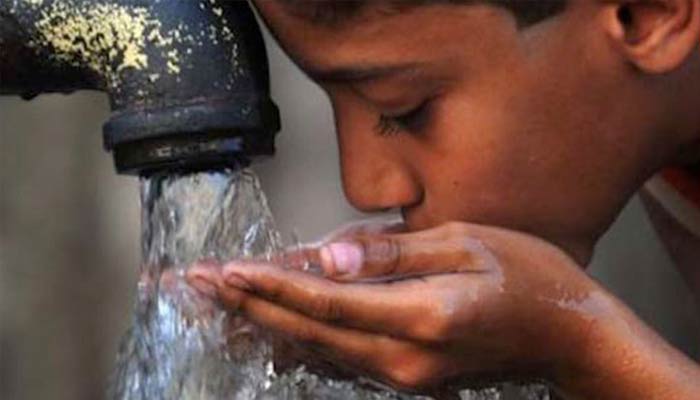‘Only 36% of Pakistan’s water considered safe for consumption’
Over 10 million flood affectees are still deprived of safe drinking water in Pakistan, says Unicef
Unicef said on Monday that over 10 million people — including children — living in Pakistan's flood-affected areas were still deprived of access to safe drinking water.
“Six months after catastrophic floods struck Pakistan, more than 10 million people, including children, living in flood-affected areas remain deprived of safe drinking water, leaving families with no alternative but to drink and use potentially disease-ridden water,” a statement issued by the humanitarian aid organisation said.
It is pertinent to mention here that torrential monsoon rainfalls, last year, caused devastating floods in the country. One-third of Pakistan was submerged in water, affecting more than thirty-three million people — many of whom were displaced or lost their homes and livelihoods.
At least 1,500 people lost their lives in the floods.
Even before the floods, the statement added, only 36% of Pakistan’s water was considered safe for consumption, despite the fact that the country’s drinking water supply system covers 92% of the population.
Moreover, the statement added: “The floods damaged most of the water systems in affected areas, compelling more than 5.4 million people, including 2.5 million children, to solely rely on contaminated water from ponds and wells.”
Reiterating that safe drinking water is a basic human right and not a “privilege”, Unicef representative in Pakistan Abdullah Fadil said: “Yet, every day, millions of girls and boys in Pakistan are fighting a losing battle against preventable waterborne diseases and the consequential malnutrition.
“We need the continued support of our donors to provide safe water, build toilets and deliver vital sanitation services to these children and families who need them the most.”
The Unicef statement voiced concerns that the prolonged lack of safe drinking water and toilets, along with the continued proximity of vulnerable families to bodies of stagnant water are contributing to the widespread outbreaks of waterborne diseases such as cholera, diarrhoea, dengue, and malaria.
“At the same time, open defecation has increased by more than 14% in the flood-affected regions. To make matters worse, the lack of proper toilets is disproportionally affecting children, adolescent girls and women who are at added risk of shame and harm when defecating outdoors.”
Unsafe water and poor sanitation are key underlying causes of malnutrition. The associated diseases, such as diarrhoea, prevent children from getting the vital nutrients they need, the statement added.
“Moreover, malnourished children are more susceptible to waterborne diseases due to already weakened immune systems, which simply perpetuates a vicious cycle of malnutrition and infection.”
Tragically, a third of all child deaths globally are attributable to malnutrition and half of all undernutrition cases are linked to infections caused by a lack of access to safe water, adequate sanitation and good hygiene.
In Pakistan, malnutrition is associated with half of all child deaths. In flood-affected areas, more than 1.5 million boys and girls are already severely malnourished, and the numbers will only rise in the absence of safe water and proper sanitation.
Ahead of World Water Day — March 22 — Unicef has urged government, donors, and partners to “urgently allocate resources to restore access to safe drinking water and toilets; invest in climate-resilient safe drinking water supply facilities; and the use of renewable technologies like solar pumping systems.
“It is imperative that the voices and the needs of children in Pakistan are prioritized at all costs and that children are placed at the heart of all post-flood recovery and resilience plans,” Fadil added.
Six months after the devastating floods, more than 9.6 million children still require access to essential social services, the statement concluded.
-
Security forces gun down 30 terrorists in multiple IBOs in KP: ISPR
-
MQM-P calls for new province in Sindh
-
US report validates Pakistan military edge over India: PM
-
Banned TTP poses serious threat to Pakistan security: UNSC panel
-
CM Afridi clarifies remarks on by-poll after ECP requests army deployment
-
Dubai sees 3.2m Pakistani passengers in 2025 as airport sets new milestone
-
Security forces kill 23 Indian proxy terrorists in KP's Kurram
-
Pakistan to construct island to boost oil exploration: report












